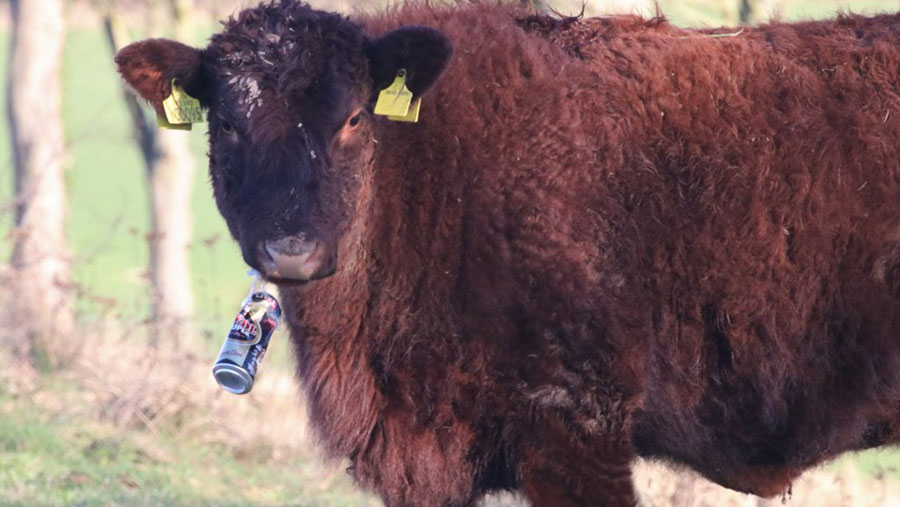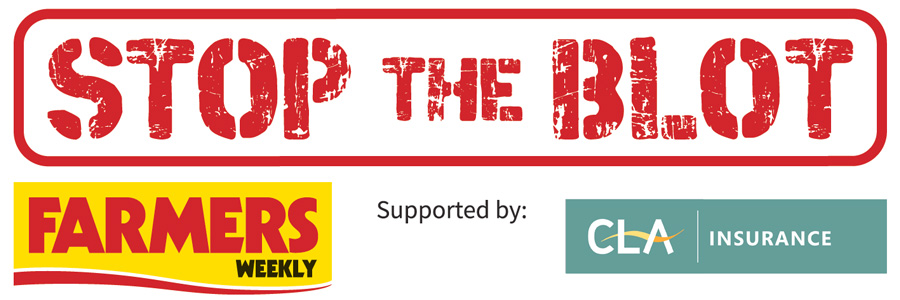Shocking image shows risk to cattle of fly-tipping
 © CLA
© CLA A shocking image of a heifer chewing on a plastic beer can ring is the latest incident of fly-tipping that demonstrates the seriousness of the crime and the risk it can pose to cattle.
The incident took place on Sunday 7 January near a picnic area at East Lighthouse, Sutton Bridge, in Lincolnshire on land where cattle graze.
Landowner Stafford Proctor, who is a member of the CLA Lincolnshire Committee, said it was another example of people showing complete disregard for the countryside.
See also: Revealed: The burden of fly-tipping on farms
Serious risk
“On this occasion, the fly-tipping was on a small scale and was a mixture of empty beer cans and bottles, but the photograph clearly demonstrates the risk to our animals,” he explained.
“The plastic around the beer cans could easily have been swallowed by our cattle, which could have caused choking or even a fatality.”
Some of the beer cans had also been shredded before being dumped and there were glass bottles that could have also caused serious injury.
He added: “Sadly, fly-tipping is not an uncommon sight on our land. We often have washing machines, building waste, fridges and tyres dumped in ditches and on fields. It happens on a near fortnightly basis.
“Until we see a zero-tolerance approach to fly-tipping the illegal dumping of waste will continue. Each time there is an incident on private land it is the responsibility of the landowner to pay for it to be cleared. We are effectively paying for a crime committed by someone else.”
‘Disgraceful crime’
CLA East regional director Ben Underwood said: “Fly-tipping is a disgraceful crime that is costing farmers and landowners thousands of pounds to clear.
“This latest incident is evidence that there is not only a financial cost of clearing the dumped waste but a risk in some cases to cattle and other animals.”
Results from a survey conducted by Farmers Weekly and CLA Insurance, as part of the joint Stop the Blot campaign to stamp out fly-tipping in the countryside, revealed that almost two-thirds of farmers and landowners have been affected by fly-tipping and over half agree it is a significant issue in their area.
Most victims surveyed said they have been targeted on multiple occasions.
Fly-tipping incidents can be reported to local authorities, the Environment Agency or the police for investigation.
CLA fly-tipping action plan
The CLA, which represents more than 30,000 landowners, farmers and rural businesses in England and Wales, has set out an action plan for how the government, farmers, landowners and rural communities can work together to tackle fly-tipping.
Making the seizure of vehicles a default penalty for fly-tipping is recommended as part of tougher punishments put forward, as well as enforcing fines for home and business owners whose waste is found in fly-tipped locations.
Stop the Blot
Fly-tippers are ruining our countryside and clean-up costs are crippling farm businesses. That’s why we have launched our Stop the Blot campaign to help raise awareness of the damage caused by fly-tipping and tackle the growing epidemic on farms.

